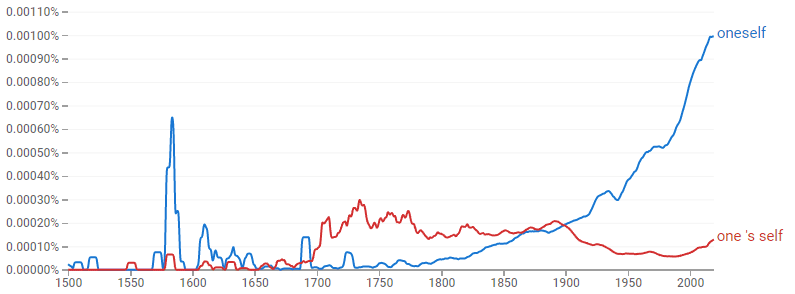The English language can be confusing, and never more so than when dealing with reflexive pronouns since they cannot be the sentence’s subject. This is why using oneself to refer to the third person singular form of yourself, is often confused with the two-word phrase one’s self.
Be aware these are not interchangeable in most cases, although oneself can more often replace one’s self than vice-versa. We explain what each means and provide examples of their proper use below.
And if you are still worried about mixing them up, we give a few tricks to remember the difference.
Is it Oneself or One’s Self?
Oneself is a reflexive pronoun, referring to a subject’s own person. The two-word phrase one’s self uses self as a noun in a spiritual, philosophical, or psychological sense. In all other cases, one’s self can be replaced with the pronoun oneself.
Oneself Defined and Examples of Use
As myself is derived from the pronoun me and yourself from the pronoun you, oneself is derived from the indefinite pronoun one. One is a neutral form that is not specific to gender and self refers to the individual “one” speaking.
It also can be used to refer to people in general. Oneself refers to one doing something for oneself.
Examples of Oneself in a Sentence
- One should have respect for oneself.
- The students were not competing against each other, but oneself.
- Providing work and finances for oneself can be difficult.
Origin of Oneself

Oneself began to be used in the mid-14th Century, defined as a person’s self and spelled as one’s self. The words were combined into oneself during the 1800s as the phrase one’s self took on a different meaning and use.
One’s Self Defined and Examples of Use
The differences between one’s self and oneself is not just grammatical; the meanings are different as well. In the phrase one’s self, one acts as a possessive pronoun.
Self works as a noun that can easily be replaced with words representing identity, personality, character, or another spiritual or psychological meaning.
Examples of One’s Self in a Sentence
- It can be hard to stay true to one’s self.
- Defining one’s self during teenage years is difficult.
- One should work on healing one’s self with patience.
How to Replace One’s Self with Oneself
Where one’s self is working both as pronouns and referring back directly to the speaker, it can be replaced with oneself.
For example:
There are individual chapters devoted to how to attire one’s self for such things as an art gallery, a barbecue, the country club. [Wall Street Journal]
Very seldom does the opportunity come along to immerse one’s self in the life and work of a major American composer. [Washington Examiner]
In today’s age, calling one’s self an American seems to come second to a party affiliation. [Daily Athenaeum]
But in these cases, one’s self is correct because self is meant in a spiritual, psychological, or philosophical sense:
[B]ut they tie into an uncritical assumption that one’s online self is a direct replica of one’s self in the real world. [The Atlantic]
For him, being a renegade is about staying true to one’s self. [Clarksdale Press Register]
But in examining the universal need to define one’s self through narrative, it also explores the darker side of storytelling. [New York Times]
Let’s Review
The use of these is tricky, but to help you remember, consider the following:Oneself is a third-person singular reflexive pronoun, similar to other reflexive pronouns like himself, herself, or themselves.
In many cases, you should be able to replace the word with another reflexive pronoun, and it will make sense.
In one’s self, one is a possessive pronoun, and self serves as a noun, representing a more spiritual or abstract meaning rather than the person. To check its use, try replacing self with another appropriate word to see if your meaning is clear.
